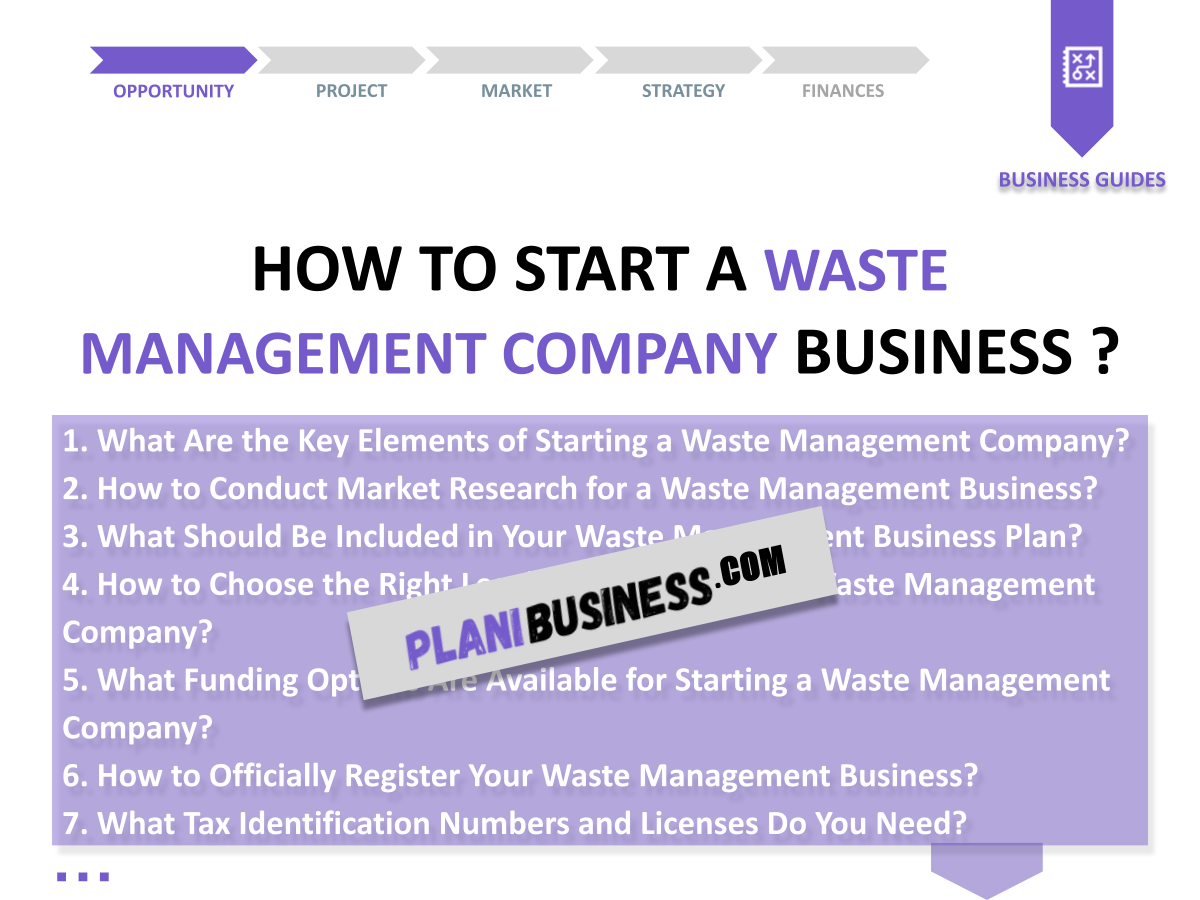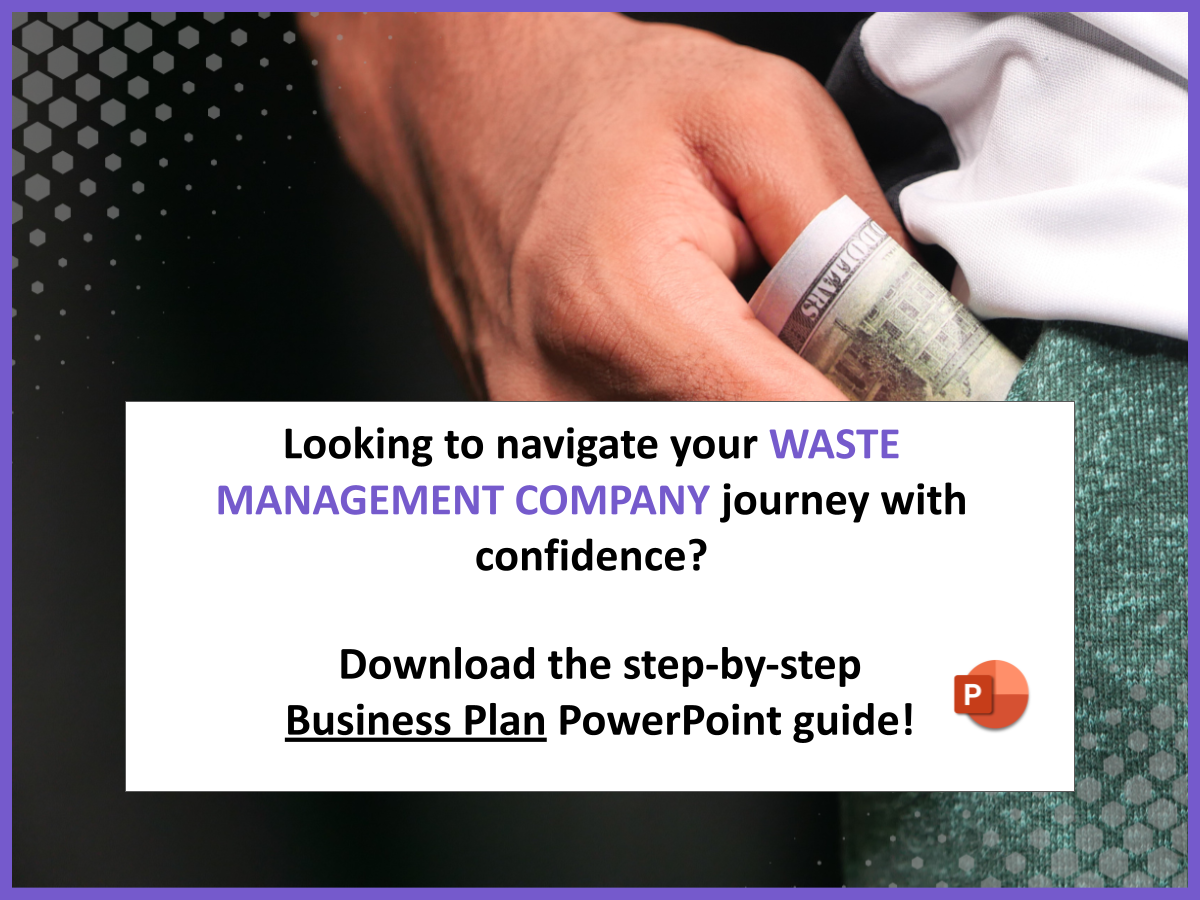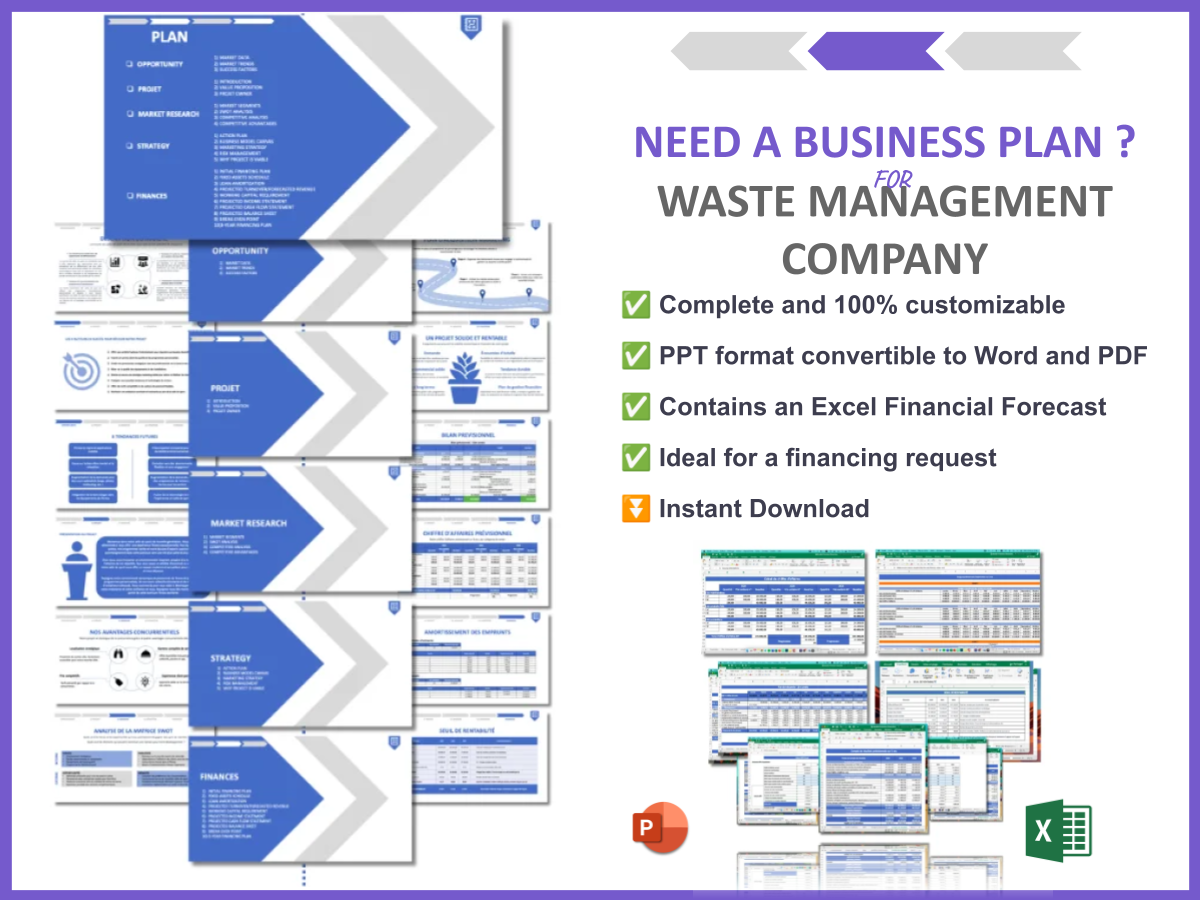Are you thinking about starting a waste management company? You’re not alone! The waste management industry is booming, with increasing demand for sustainable solutions. In fact, the global waste management market is projected to grow significantly over the next few years. This growth means that now is a perfect time to dive into this essential sector. In this article, we will explore how to start a waste management company by covering key elements like market research, business planning, and branding. Whether you’re passionate about environmental sustainability or simply looking to tap into a lucrative business, this guide will provide you with the insights you need.
- Understand the key elements of starting a waste management company.
- Conduct thorough market research to assess your competition.
- Learn how to create a solid business plan for success.
- Choose the right legal structure for your company.
- Explore funding options available for your business.
- Establish a strong brand identity and effective marketing strategies.
1. What Are the Key Elements of Starting a Waste Management Company?
When considering how to start a waste management company, it’s crucial to understand the fundamental elements that drive this business. The waste management industry is not just about collection; it’s about sustainability, recycling, and innovative solutions. Here are some key aspects to consider:
- Understanding local waste disposal needs: Every community has unique waste management requirements. Conducting an analysis of the waste generated in your area is essential.
- Identifying potential services: Determine whether you want to focus on residential, commercial, or industrial waste management services.
- Researching environmental impacts: Familiarize yourself with local environmental regulations and how they affect waste management practices.
By thoroughly understanding these elements, you can better position your business to meet the needs of your community while adhering to regulations and promoting sustainability.
2. How to Conduct Market Research for a Waste Management Business?
Market research is the backbone of any business, and for how to start a waste management company, you’ll need to analyze existing competitors and understand customer needs. Here’s a simple table to guide you:
| Research Area | Questions to Consider |
|---|---|
| Competitors | Who are the main players in your area? What services do they offer? |
| Demand | What services are most requested by customers? Are there gaps in the market? |
| Pricing | What are competitors charging for their services? How can you price competitively? |
Conducting market research will help you identify opportunities and challenges, enabling you to create a more targeted business strategy. Use surveys, interviews, and online research to gather valuable insights into customer preferences and competitor performance.
3. What Should Be Included in Your Waste Management Business Plan?
A solid business plan is essential for any entrepreneur, especially when you’re figuring out how to start a waste management company. A comprehensive plan will not only guide your operations but also help you secure funding. Here are the key components that should be included in your business plan:
- Executive Summary: This section provides a snapshot of your business and outlines your mission, vision, and goals.
- Market Analysis: Summarize your market research findings, including information on your target customers and competitors.
- Marketing Strategy: Describe how you plan to attract and retain customers through various marketing channels.
- Financial Projections: Include projected income statements, cash flow forecasts, and break-even analysis to demonstrate the financial viability of your business.
For more detailed guidance, I recommend checking out this business plan template for Waste Management Company. It’s super detailed and can save you a ton of time!
4. How to Choose the Right Legal Structure for Your Waste Management Company?
Choosing the right legal structure for your business is a big decision that can impact your taxes, liability, and operations. For how to start a waste management company, you can consider several options, including:
| Legal Structure | Advantages | Disadvantages |
|---|---|---|
| Sole Proprietorship | Simple setup, complete control over business decisions. | Unlimited personal liability for business debts. |
| Limited Liability Company (LLC) | Limited liability, tax flexibility, and less formalities than a corporation. | More paperwork and costs associated with formation. |
| Corporation | Limited liability, ability to raise capital through stock sales. | Complex structure, double taxation on profits. |
Each structure has its pros and cons, so consider factors such as your business goals, the level of risk you are willing to take, and your funding needs. Consulting with a legal professional can also help you make the best choice for your specific situation.
5. What Funding Options Are Available for Starting a Waste Management Company?
Securing funding is often a challenge for new businesses, and understanding your options is crucial when figuring out how to start a waste management company. Here are some potential funding sources you might consider:
- Bank Loans: Traditional loans can provide a significant amount of capital, but they often require a solid business plan and good credit history.
- Angel Investors: These individuals are willing to invest in promising startups in exchange for equity. They can also offer valuable mentorship.
- Crowdfunding Platforms: Websites like Kickstarter or Indiegogo allow you to raise small amounts of money from many people. This option can also help you gauge public interest in your business idea.
It’s important to carefully evaluate each funding option and consider factors such as interest rates, repayment terms, and the potential impact on your business control. Creating a detailed financial plan can also help attract investors and lenders.
6. How to Officially Register Your Waste Management Business?
Registering your business is a crucial step in legitimizing your operations and allowing you to operate legally. Here are the key steps to consider when thinking about how to start a waste management company:
- Choosing a Business Name: Select a unique name that reflects your services and resonates with your target audience.
- Registering with Local Authorities: File the necessary paperwork with your local government to register your business name and structure.
- Obtaining Necessary Licenses and Permits: Check local regulations to identify the specific licenses and permits required for waste management services. This may include:
| License/Permit | Description |
|---|---|
| Business License | A general license required to operate any business legally. |
| Environmental Permits | Permits needed to comply with environmental regulations related to waste disposal and recycling. |
| Vehicle Registration | Registration for any vehicles used in your waste collection operations. |
By completing these steps, you will ensure that your waste management company operates within the law and is set up for success. It’s advisable to consult with a legal expert to ensure compliance with all regulations.
7. What Tax Identification Numbers and Licenses Do You Need?
Understanding the tax landscape is crucial when considering how to start a waste management company. You’ll need to obtain several important tax identification numbers and licenses to operate legally. Here’s a breakdown of what you should consider:
- Employer Identification Number (EIN): This unique number is required for tax purposes and is essential if you plan to hire employees.
- State-Specific Licenses: Depending on your location, you may need additional licenses specific to your state or municipality. These can vary significantly.
- Environmental Permits: Depending on the nature of your waste management services, you may need permits to comply with environmental regulations.
Obtaining these numbers and licenses ensures that your business operates within legal boundaries and maintains compliance with federal and state regulations. It’s wise to consult a tax professional to navigate the complexities of business taxes and licensing.
8. How to Select the Right Insurance for Your Waste Management Company?
Insurance is key to protecting your investment and minimizing risks associated with running a business. When figuring out how to start a waste management company, consider the following types of insurance:
- General Liability Insurance: This insurance protects your business from claims related to injuries or damages that occur on your premises or as a result of your services.
- Commercial Auto Insurance: If you are using vehicles for waste collection, this insurance is necessary to cover accidents and damages involving your business vehicles.
- Workers’ Compensation Insurance: This is essential if you plan to hire employees. It covers medical expenses and lost wages for employees injured on the job.
Choosing the right insurance policy can be daunting, but it is crucial for safeguarding your business against potential liabilities. Consult with an insurance agent who specializes in commercial insurance to find the best coverage for your specific needs.
9. What Financial Management Systems Should You Set Up?
Setting up robust financial management systems will save you headaches later and is essential for how to start a waste management company. A solid financial system helps you track income, expenses, and overall financial health. Here are some critical components to consider:
- Accounting Software: Invest in reliable accounting software like QuickBooks or FreshBooks to manage your finances efficiently.
- Budgeting Tools: Create a budget that outlines your expected revenues and expenses to keep your finances in check.
- Cash Flow Management: Monitor your cash flow closely to ensure that you can meet your financial obligations and avoid any cash shortages.
By implementing these systems, you will have a clearer picture of your financial situation, allowing you to make informed decisions for your waste management business. Consider using a table to summarize your financial metrics for easy reference:
| Financial Metric | Description |
|---|---|
| Revenue | Total income generated from services provided. |
| Expenses | Total costs associated with running the business, including salaries, equipment, and maintenance. |
| Net Profit | Revenue minus expenses; the actual profit your business makes. |
10. How to Establish Your Brand Identity in Waste Management?
Your brand is your company’s face and sets the tone for how customers perceive you. When learning how to start a waste management company, consider the following steps to establish a strong brand identity:
- Logo Design: Create a memorable logo that reflects your services and values. A good logo can make a lasting impression.
- Tagline Creation: Develop a catchy tagline that encapsulates your business mission. This helps customers quickly understand what you offer.
- Community Engagement Strategies: Get involved in local events and initiatives to showcase your commitment to sustainability and community welfare.
Building a strong brand identity can help differentiate your waste management company from competitors and attract more customers. Remember, consistency in your branding across all platforms—website, social media, and marketing materials—is key to establishing trust and recognition.
11. How to Develop a Professional Website for Your Business?
In today’s digital age, a professional website is essential for any business, including a waste management company. A well-designed website can enhance your credibility and attract new customers. Here are the key elements to include:
- Easy Navigation: Ensure that visitors can easily find information about your services, pricing, and contact details.
- Service Descriptions: Clearly outline the services you offer, such as waste collection, recycling, or consulting.
- Contact Information: Make it easy for potential customers to reach you by providing multiple contact options, including phone numbers, email addresses, and a contact form.
Additionally, consider integrating a blog section where you can share tips on waste management, recycling, and sustainability practices. This not only provides value to your audience but also helps improve your search engine optimization (SEO) efforts.
12. What Marketing Strategies Should You Implement?
Marketing is vital for attracting customers to your waste management company. Here are some effective strategies to consider:
- Social Media Campaigns: Utilize platforms like Facebook, Instagram, and LinkedIn to connect with your audience and promote your services.
- Local SEO Strategies: Optimize your website for local search terms to ensure that people in your area can easily find your services.
- Community Events: Participate in or sponsor local events to raise awareness about your company and its commitment to sustainability.
Consider using a table to summarize the various marketing channels and their potential benefits:
| Marketing Channel | Benefits |
|---|---|
| Social Media | Engage with customers, share updates, and promote services. |
| Email Marketing | Directly communicate with customers, offer promotions, and share news. |
| Content Marketing | Establish authority in the industry and attract organic traffic. |
13. How to Assemble Your Team for Success?
Hiring the right team is crucial for the success of your waste management company. Here are some steps to help you build an effective team:
- Job Descriptions: Clearly define the roles and responsibilities for each position, whether it’s drivers, customer service representatives, or management.
- Hiring Processes: Develop a systematic hiring process that includes interviews, background checks, and skills assessments to find the best candidates.
- Employee Training Programs: Implement training programs to ensure that your team is knowledgeable about waste management practices, safety protocols, and customer service.
By investing time and resources into assembling a talented and dedicated team, you will create a strong foundation for your waste management company. Remember, a motivated team can lead to improved service quality and customer satisfaction.
Conclusion
Starting a waste management company is a rewarding venture that not only provides a valuable service but also contributes positively to the environment. By following the steps outlined in this guide, you can successfully navigate the challenges of launching your business. Remember, thorough market research, a solid business plan, and effective marketing strategies are crucial for your success.
To further enhance your knowledge and improve your business strategy, I encourage you to explore our articles on how to create a SWOT Analysis for Waste Management Company and How to Develop a Waste Management Company Marketing Plan? With Example. These resources will provide you with valuable insights to help you excel in the waste management industry.
FAQ
- What are the initial steps to start a waste management company? Begin by conducting market research, creating a business plan, and selecting a legal structure for your company.
- What licenses do I need to operate a waste management business? You will need a business license, environmental permits, and possibly state-specific licenses depending on your location.
- How can I secure funding for my waste management company? Consider options such as bank loans, angel investors, or crowdfunding to secure the necessary capital.
- What are common services offered by waste management companies? Services typically include waste collection, recycling, hazardous waste disposal, and waste consulting.
- How important is a business plan for a waste management company? A business plan is crucial as it outlines your strategy, helps secure funding, and guides your operations.
- What insurance do I need for my waste management business? General liability, commercial auto, and workers’ compensation insurance are essential to protect your business.
- How can I market my waste management services? Utilize social media, local SEO strategies, and community engagement to promote your services effectively.
- What are the challenges in the waste management industry? Challenges include regulatory compliance, competition, and managing operational costs while ensuring sustainability.
- How can technology improve my waste management company? Implementing waste management software can streamline operations, improve customer service, and enhance efficiency.
- What role does sustainability play in waste management? Sustainability is essential in waste management as it focuses on reducing waste, recycling, and minimizing environmental impact.







